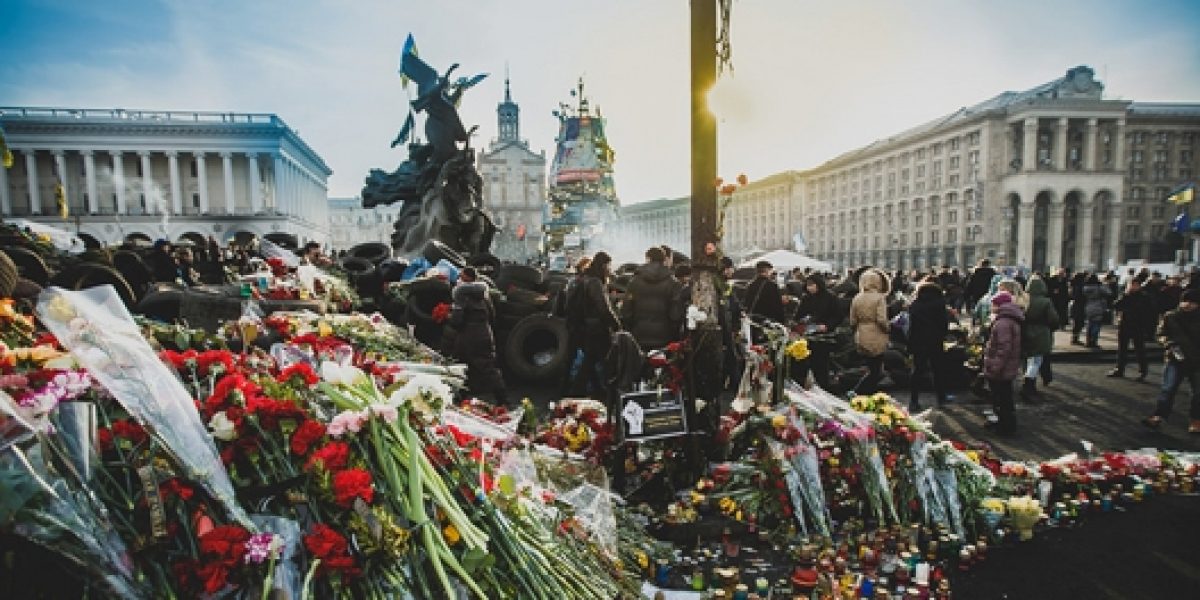In an effort to end the three-month political standoff and violence, on 21 February 2014, opposition leaders signed an agreement with President Viktor Yanukovych. It consisted of three main points: an immediate end to hostilities between demonstrators and security forces; a return to the presidential-parliamentary constitution of 2004; and early presidential elections no later than December 2014.
However, the protesters at Maidan – the capital’s Independence Square – rejected the deal. The opposition was booed and a young protester took the microphone. In a brief but emotional speech, he summed up the feelings of the people better than any politician. The deaths of 100 protesters in the preceding week meant that Yanukovych had to resign.
Two hours later, news emerged that the President had fled the capital, Kyiv. The parliament, the presidency and his residence were all abandoned. He later made a short television appearance, calling the situation a coup and stating that he would not sign the peace agreement laws. The parliament promptly used this to effectively impeach Yanukovych, by voting to accept that he had ‘removed himself from authority’. Although this had no constitutional basis, it was a political decision, to establish a legitimate central organ of power in Ukraine, to stabilise the situation. 25 May 2014 was also set as the date for new presidential elections. Until then, speaker Olexandr Turchynov would be the acting president.
For just under one week Ukrainians dreamt of focusing their energies on rebuilding the corrupt state systems and institutions according to international standards of transparency, accountability and the rule of law.
However, everything changed with an armed takeover of the Crimean parliament on 27 February by pro-Russian forces. Crimea has enjoyed a special status within Ukraine since 1991 as an autonomous republic, rather than province, having its own legislature and considerable independence from Kyiv.
Events followed quickly. On 1 March, Russian President Vladimir Putin obtained parliamentary approval to intervene militarily on the territory of Ukraine. The pretext given was defending rights of Russian speakers. However, no violation of such rights has been reported since Yanukovych fled the country. Although Russia was quick to point to the parliament’s proposed abolishment of a controversial law on the status of regional languages, including Russian, this was never signed into force by Turchynov.
Under control of soldiers, who were fully equipped militarily but did not bear insignia, Crimea set a referendum for 15 March, giving voters the choice of independence or joining Russia. Highly disputed poll results showed an 85% turnout with 97% voting in favour of becoming part of Russia. Crimean Tartar leader Mustafa Dzhemilev, whose people represent 20% of the peninsula’s population, claimed that according to a leaked document he saw, the referendum only had a 34% turnout.
Although the referendum was unconstitutional under Ukrainian law and rejected by the vast majority of the international community, Russia quickly moved to annex Crimea. North Korea and Syria are amongst a handful of nations who recognise the move. The rest of the world does not and many countries, such as the US, Japan, Canada, Australia and EU member states have also imposed targeted sanctions against Russian and Crimean officials. This stance was reaffirmed at the United Nations General Assembly on 27 March, with 100 countries voting in favour of a resolution supporting the territorial integrity of Ukraine, 58 abstaining and only 11 voting against.
This situation in Crimea sets a dangerous precedent in international relations. Russia’s justification for the invasion, holding of a disputed referendum and subsequent annexation of a part of a sovereign state is ‘protection of the Russian world’. This concept is vague and potentially paves the road for it to intervene militarily in other former Soviet members and satellites, such as the Baltic countries.
There are currently tens of thousands of Russian troops engaged in military drills on the eastern border of Ukraine, complete with tanks, armoured vehicles and artillery. Coupled with the capture of provocateurs in the east and south of Ukraine, with explosives and alleged links to Russian security forces, this gives rise to fears of a repeat of the Crimean scenario in other Ukrainian provinces, or even an outright invasion.
In spite of both its markets and currency being in freefall since the decision to intervene militarily in Ukraine, Russia is unlikely to focus on internal problems at the expense of trying to further reassert its status as a ‘superpower’ in the international arena. Russia is highly protective of its ‘near abroad’, as exemplified in attacks on the EU and US for alleged interference in Ukraine. It has been trying to recreate the former Soviet Union in one way or another, since its break-up in 1991, which Putin once referred to as the ‘greatest geo-political disaster of the last century’.
As ideological differences with the West endure, Russia will continue to attempt to carve out its own spheres of influence. But if its aggression is not curbed, Putin is unlikely to stop at Crimea.








